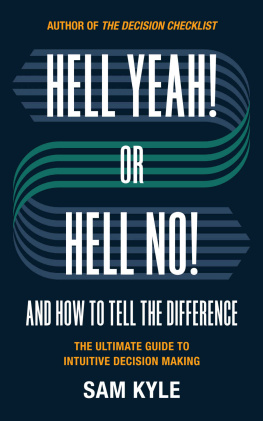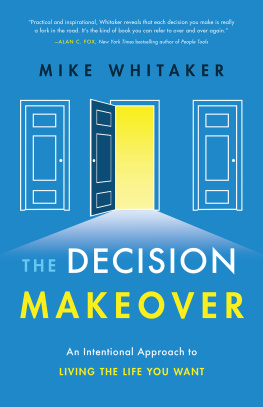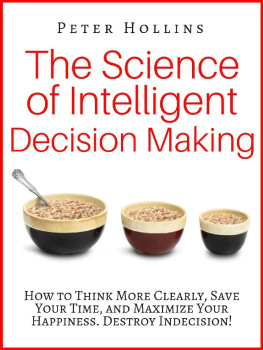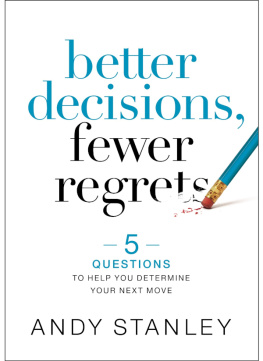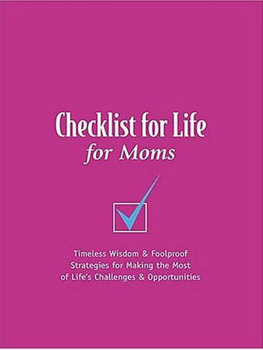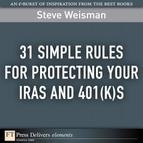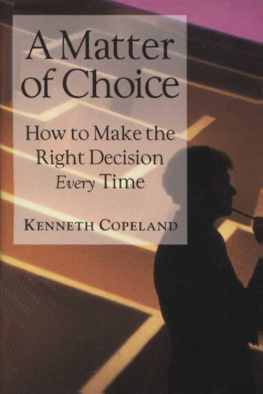Contents
Decision Checklist
Timeless steps to help you make meaningful decisions that will improve your career and your life
By Sam Kyle
@crispytacoegg
Copyright information
Copyright 2018 by Sam Kyle
Published in the United States by Sam Kyle
All rights reserved. No part of this publication may be reproduced, stored in a retrieval system, or transmitted in any form or by any means (including electronic, mechanical, photocopying, recording, or otherwise) without prior written permission from the author.
Printed in the United States of America
First Edition
This book is for students of life.
May we all learn together.
When you do as everyone else does, dont be surprised when you get what everyone else gets.
Peter Kaufman
Introduction
The year was 1962. Dick Rowe, an executive at Dacca Records, had just listened to the audition tape of a band called the Silver Beatles, which included fifteen tracks on a twelve-inch audio tape and had been recorded a month prior when the band auditioned for producer Tony Meehan. After hearing the tape, Rowe was impressed, but had a gut feeling that guitar bands were falling out of favor, so he passed on signing the group.
The Silver Beatles later changed their name to the Beatles, signed with EMI Records, and went on to make $38.5 million by the end of the summer of 1967.
Dick Rowe probably lost a lot of sleep over his decision. And, obviously, hed missed making a fortune. But as a business executive, hed had to make a decision. Unfortunately, hed made the wrong one.
The decision-making dilemma
Maybe youre not making decisions every day that could launch the next great band, or cost your company millions (or, maybe you are), but youre all faced with important and consequential decisions that directly impact your organization, your colleagues, and, ultimately, your success.
If youre reading this book, youre looking for answers about how to make better decisions. Youre not alone. People have struggled to make decisions throughout history. Think about Napoleon deciding to invade Russia, leaders at NASA ignoring the O-ring issues on the Challenger, Margaret Thatcher deciding to get behind a poll tax that ended up getting her ousted by her own party, or George Bush making the decision to invade Iraq. These people were professional decision makers, with all the relevant information available to them, and yet they still made poor decisions. If they cant get it right, what hope is there for the rest of us?
But business schools, or any schools for that matter, dont offer courses on decision making. Youre left with what you were taught as a child, or have expensively learned through trial and error, or have learned by observing leaders you admire. Maybe these ways of making decisions result in a good outcome once in a while. But rarely do we take the time to evaluate if our cobbled-together decision-making processes really work well on a consistent basis.
Think back on your life. Youve likely made decisions about where to go to college, what to study, whom to marry, what career to pursue, and countless others. Those decisions changed the course of your life, yet how many of you were really prepared to make them? What eighteen-year-old is ready to make decisions about a career, what school to attend, what to major in? I know I certainly wasnt.
And when were older, once we have a job, once we get empowered to finally make decisions and eventually lead people, we have the responsibility to make decisions that not only affect our lives, but the lives of others. We make decisions about promotions, what projects to invest in, whether to lay off people. Our decisions create our legacies.
Even small, seemingly inconsequential decisions can matter a lot over time. Think about your diet. What you eat every day may not matter much, but over months and years, eating at McDonalds every day will probably give you a potbelly and high blood pressure. And in a similar way, the seemingly small decisions you make in your job add up over time, for good or bad.
Not only do we struggle with not knowing the optimal way to make decisions, but we are also overwhelmed. We have decision-making fatigue. So much mental energy goes into decision making, that even deciding on clothes for the day can drain us. Thats why smart leaders pare down their decisions so they can focus on whats essential.
Former President Barack Obama wore the same thing every day. He said, Youll see I wear only gray or blue suits. Im trying to pare down decisions. Steve Jobs did the same thing. He wore a black turtleneck with jeans.
As leaders, we have the responsibility to make good decisions. Our outcomes are to a large extent the product of the decisions we make. But decision making is hard. So what do we do? We follow our intuition without having a process to support it. We overanalyze until we have analysis paralysismulling over so much information that we cant bring ourselves to make a decision. Or, we pass the responsibility to a committee or someone else. We shirk our responsibility.
Decision makingthe process of making a decisioncan be derailed by many things. Wed like to think we make logical, thoughtful decisions, but often our decision-making processes are affected by emotions, fatigue, mental errors, or procrastination.
Good decision making starts here
Thats why I wanted to write this bookbecause I realized other people are just as passionate as I am to find a way to make better decisions. I wanted to provide another resource, all in one place, where people could learn how to make better decisions to improve their careers and their lives. How can we make better decisions? How can we assess the decisions weve already made? What about the decisions of others? And how can we learn more about ourselves, and our decision-making processes, so that we can be the leaders we are meant to be?
When it comes to making decisions, or doing anything, really, the person with the fewest blind spots wins. The more we can eliminate any blind spots we have when making decisions, the more we will improve our ability to make correct decisions, and thus improve our organizations.
Imagine playing poker, and you can see everyone elses cards, but they cant see yours. Youre playing by the same rules, but you have the advantage. Because you have fewer blind spots than your competitors, you play your hands differently, and probably win more often, right?
Its the same with decision making. When we have fewer blind spots, we make better initial decisions and avoid problems.
In order to make better initial decisions, we need to understand exactly what good decision making looks like, and develop habits that lead to repeatable success. Thats what this book can do for you.
How to use this book
For our purposes in this book, the definition of a good decision is when we use a good process on a consistent basis to make decisions. While a good process does not guarantee a good outcome, it sure does improve your chances! This book will give you the tools you need to learn more about how you currently make decisions, give you the resources to make better decisions, and offer you the time and space to really THINK about your decision making. This book will help you:
- Explore how and why you make decisions
- Find a clear path to overcoming barriers
- Improve your decision-making process
- Spend time thinking about your decisions and decision-making process in a three-dimensional way by using a decision journal
This book isnt just about gaining knowledge; its also about putting that knowledge to use. Whats the point of learning something if you dont put it into action? So, as you read each chapter, spend time thinking about the information and wisdom contained in it, and how it can help you improve your decision-making skills.


